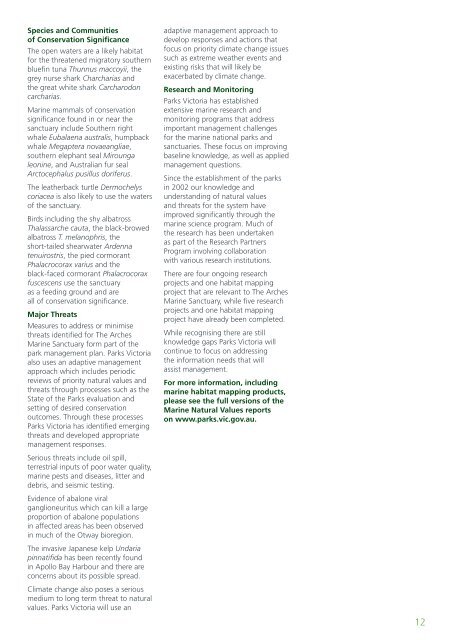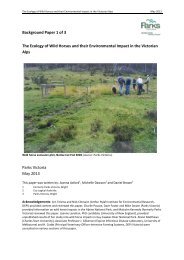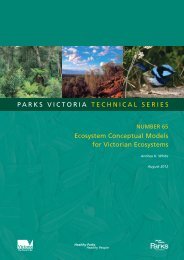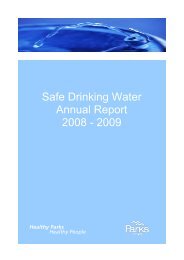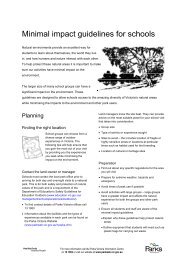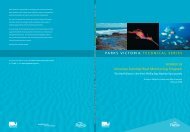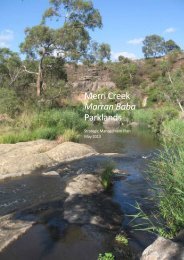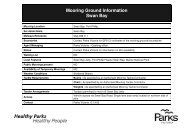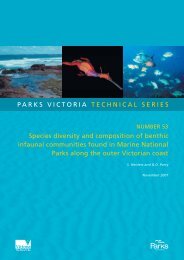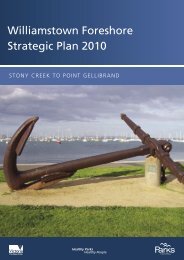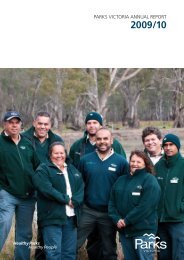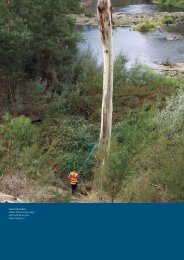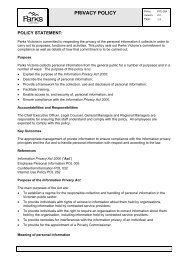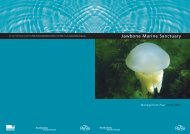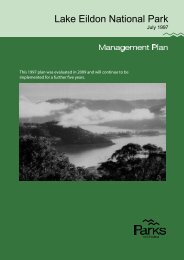Marine Natural Values Study Summary - Parks Victoria
Marine Natural Values Study Summary - Parks Victoria
Marine Natural Values Study Summary - Parks Victoria
Create successful ePaper yourself
Turn your PDF publications into a flip-book with our unique Google optimized e-Paper software.
Species and Communitiesof Conservation SignificanceThe open waters are a likely habitatfor the threatened migratory southernbluefin tuna Thunnus maccoyii, thegrey nurse shark Charcharias andthe great white shark Carcharodoncarcharias.<strong>Marine</strong> mammals of conservationsignificance found in or near thesanctuary include Southern rightwhale Eubalaena australis, humpbackwhale Megaptera novaeangliae,southern elephant seal Miroungaleonine, and Australian fur sealArctocephalus pusillus doriferus.The leatherback turtle Dermochelyscoriacea is also likely to use the watersof the sanctuary.Birds including the shy albatrossThalassarche cauta, the black-browedalbatross T. melanophris, theshort-tailed shearwater Ardennatenuirostris, the pied cormorantPhalacrocorax varius and theblack-faced cormorant Phalacrocoraxfuscescens use the sanctuaryas a feeding ground and areall of conservation significance.Major ThreatsMeasures to address or minimisethreats identified for The Arches<strong>Marine</strong> Sanctuary form part of thepark management plan. <strong>Parks</strong> <strong>Victoria</strong>also uses an adaptive managementapproach which includes periodicreviews of priority natural values andthreats through processes such as theState of the <strong>Parks</strong> evaluation andsetting of desired conservationoutcomes. Through these processes<strong>Parks</strong> <strong>Victoria</strong> has identified emergingthreats and developed appropriatemanagement responses.adaptive management approach todevelop responses and actions thatfocus on priority climate change issuessuch as extreme weather events andexisting risks that will likely beexacerbated by climate change.Research and Monitoring<strong>Parks</strong> <strong>Victoria</strong> has establishedextensive marine research andmonitoring programs that addressimportant management challengesfor the marine national parks andsanctuaries. These focus on improvingbaseline knowledge, as well as appliedmanagement questions.Since the establishment of the parksin 2002 our knowledge andunderstanding of natural valuesand threats for the system haveimproved significantly through themarine science program. Much ofthe research has been undertakenas part of the Research PartnersProgram involving collaborationwith various research institutions.There are four ongoing researchprojects and one habitat mappingproject that are relevant to The Arches<strong>Marine</strong> Sanctuary, while five researchprojects and one habitat mappingproject have already been completed.While recognising there are stillknowledge gaps <strong>Parks</strong> <strong>Victoria</strong> willcontinue to focus on addressingthe information needs that willassist management.For more information, includingmarine habitat mapping products,please see the full versions of the<strong>Marine</strong> <strong>Natural</strong> <strong>Values</strong> reportson www.parks.vic.gov.au.Serious threats include oil spill,terrestrial inputs of poor water quality,marine pests and diseases, litter anddebris, and seismic testing.Evidence of abalone viralganglioneuritus which can kill a largeproportion of abalone populationsin affected areas has been observedin much of the Otway bioregion.The invasive Japanese kelp Undariapinnatifida has been recently foundin Apollo Bay Harbour and there areconcerns about its possible spread.Climate change also poses a seriousmedium to long term threat to naturalvalues. <strong>Parks</strong> <strong>Victoria</strong> will use an12


